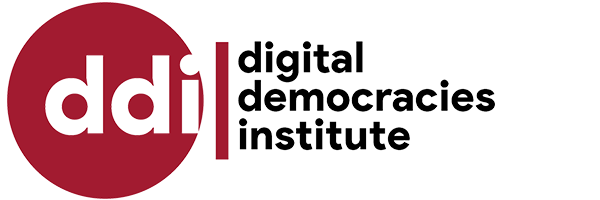Dr. Roopa Vasudevan joined us virtually to present as part of the Digital Democracies Institute 2023 Summer Speaker Series on June 28. Dr. Vasudevan is a media artist, computer programmer, and scholar based in part of Lenapehoking now known as Philadelphia. She received her PhD from the Annenberg School for Communication at the University of Pennsylvania in 2023, and beginning this fall will be an Assistant Professor in the Department of Art at the University of Massachusetts, Amherst.
Abstract: High-Level Creativity: New Media Art and the Priorities of the Tech Industry
Artists working with emerging technologies are often depicted as existing “outside” of the technology industry, both by scholars exploring technology and society as well as within their own perceptions of themselves and their output. Their works are alternately positioned as innovations, diagnostics and correctives; they are frequently depicted as carrying unique perspectives that do not exist within the technology industry otherwise. However, these artists are very much subject to the norms and limitations inherent to digital technology. The protocols and ideologies of the industry have a sizable impact on the work artists can make; how they are able to share and preserve it; and even how they envision their broader cultural roles.
This project examines the relationships between new media artists—practitioners who see themselves expanding, reinventing, or misusing technological expression—and the industry that controls the tools, resources, and protocols necessary for their work. I demonstrate that new media artists are heavily bound up in the workings of the contemporary tech industry, in both material and ideological ways. Drawing on theories of art worlds, scientific infrastructure and creative labor, I argue that the power and impact that the tech industry exerts on almost every facet of contemporary life also guides, influences and shapes the creative possibilities and conventions that new media artists are able to harness in their practices. Additionally, using the concept of the imagined affordance, I make the case that, rather than operating externally to the industry, these artists are seen as a vital resource due to their perceived ability to envision uses for emerging technologies that elude the capabilities of traditional engineers and developers. Through this revised subject position, I argue that we can gain a more nuanced understanding of where and how the tech industry exerts control over culture and creative practice, allowing for a re-conceptualization of how art can challenge the dominance of technical systems.
